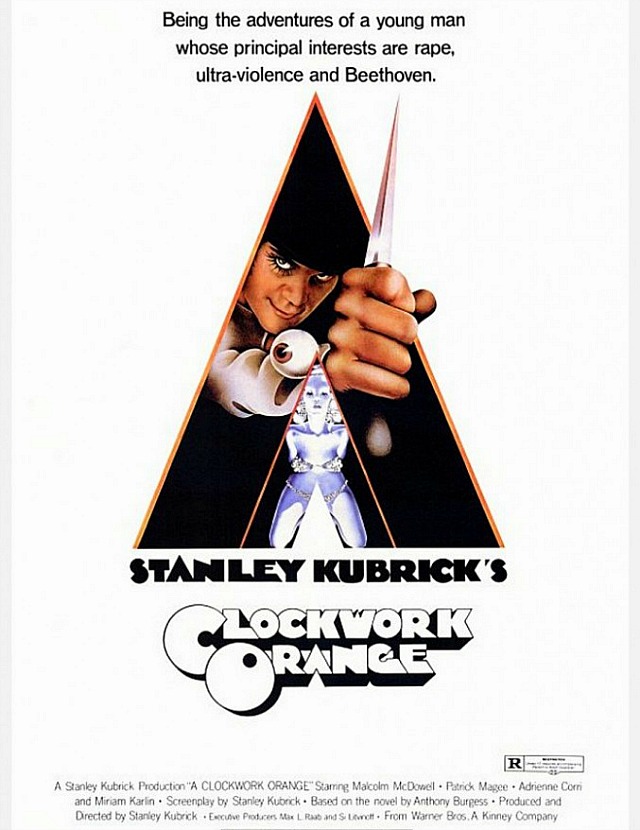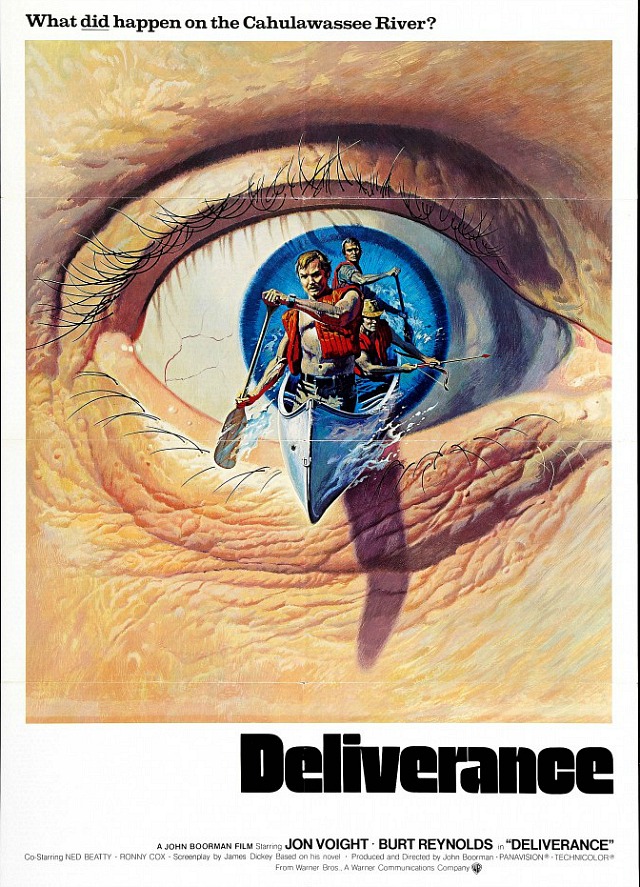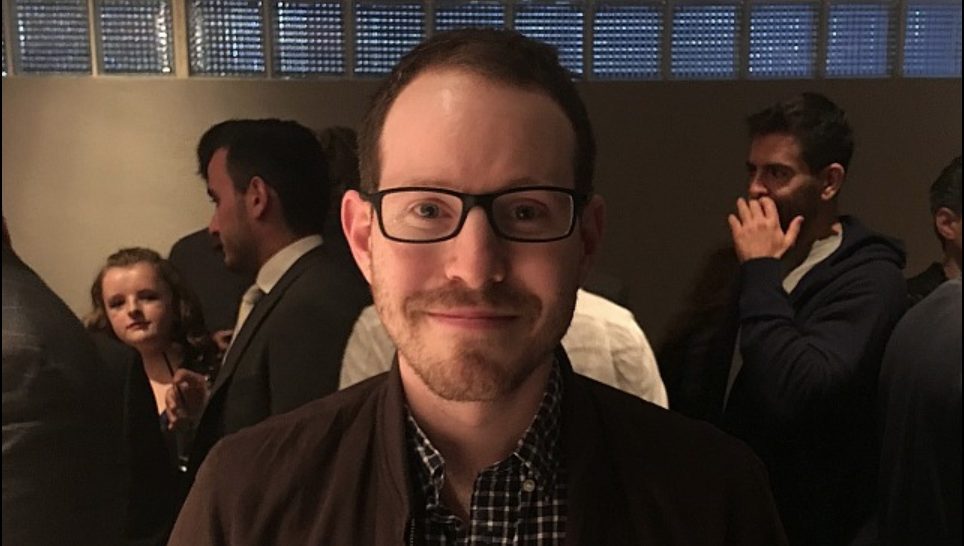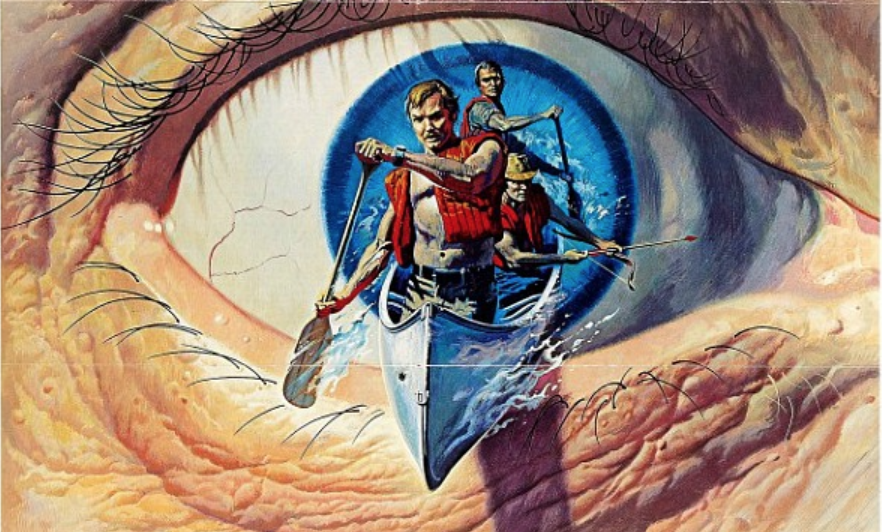After making so many outrageous crap-level movies, how can Dwayne Johnson expect to seriously compete as a Republican presidential candidate in 2024? Won’t voters resent him for appearing in nothing but shit-level “entertainments” for so many years? Compared to Johnson Arnold Schwarzenegger was Laurence Olivier by the time he began running for California governor in the early aughts. The Terminator, Predator, Total Recall, Kindergarten Cop, Terminator 2: Judgment Day, True Lies, Eraser, Batman and Robin — Schwarzenegger was a mainstream action star, but at least he made a few semi-respectable films. Johnson just wants to parade around and make dough.
Daily
Forgiveness Is Off The Table
Imagine there’s an actual sentient God — a universal, all-powerful, all-knowing, all-controlling glowforce with His/Her finger on the button of absolutely everything, and Ethan Hawke‘s Reverend Toller comes over, sits down, takes a swig of whiskey and asks, “Will you forgive us for what we’ve done to this world? Will you cut humankind a break for polluting and greenhouse-gassing and over-developing so much of your good green paradise?”
God would take a breath, clear his throat, take Toller’s hand, look him in the eye and say, “Forgive in what way? Even if I felt like forgiving, what good would it do? It’s a crazy question. Century after century humans have asked it, and the answer has never changed: “I don’t forgive. I never have and I never will. There’s only one rule of the physical universe, and you’ve been hearing it since you were just a proverbial knee-high. As you sow, so shall you reap. And you know what that means.
“Put another way, I’m not in this. It’s your planet. If you want to flood your low-lying cities with sea water and turn the green verdant hills into toxic waste dumps, knock yourselves out. You’ll be ruining the lives of your grandchildren and especially your great-grandchildren, of course, but fuck ’em, right? The fact that you can’t see any farther than the tip of your own nose is not my affair. I’m not a judge or a referee or even a landlord. You want the real truth? I don’t even exist. Okay, I shouldn’t have said that. That was raw. I’m sorry. I blurt stuff out.”
Aliens In A Cow Pasture
Paul Dano‘s Wildlife (IFC Films, 10.19) is a sluggish but strongly directed middle-class horror film — cold, creepy, perverse. I didn’t hate it because of Dano’s visual discipline (handsome compositions, a restrained shooting style, extra-scrupulous 1960 period design) and because of Carey Mulligan‘s fascinating performance as a youngish cheating mom in a small Montana town. But it’s a funereal gloom movie, and it makes you feel like you’re sinking into a cold swamp.
On top of which I was appalled — astonished — by the cruel, self-destructive behavior of this sad 34 year-old woman, whose name is Jeanette, and particularly by her decision to invite her 14 year-old son Joe (Ed Oxenbould) to almost participate in some extra-marital humping with a rich, small-town fat guy (Bill Camp) while her irresponsible husband Jerry (Jake Gyllenhaal) is off fighting a forest fire with local volunteers.
Yes, the screenplay (by Dano and Zoe Kazan) is an adaptation of a 1990 Richard Ford novel so blame Ford, right? But who dreams up stuff like this? And what kind of mother has ever injected this kind of sexually odious poison into her son’s life?
Infidels hide their affairs, particularly from their kids. But Jeanette more or less whispers in her son’s ear, “I dunno but I kinda like this balding Uriah Heep…he’s rich and definitely not your father, and so I’m feeling flirty and thinking about…well, I’ve said enough.” And the kid just stares at her like she’s some kind of conniving ghoul from a Vincent Price flick. Later she says she’s miserable and almost ready to kill herself, but that doesn’t negate the earlier thing.
So Wildlife is partly admirable, yes, but mostly an endurance test. The feeling of watching it is something like “all right, this is grim and getting grimmer but I can handle it…I certainly love Mulligan and Gyllenhaal’s acting but Oxenbould…the kid is torture. He doesn’t look like Carey or Jake, of course — familial resemblance almost never happens in movies — but he wears the exact same expression in every scene in the film…a look of intimidation, anxiety, quiet horror, shock, dread…every damn scene.”
But Dano knows how to visually compose and hold to a certain austere style, and Mulligan is always peak-level, no matter the role.
Natives Are Restless
From Frank Bruni‘s “Robert Mueller, You’re Starting to Scare Me,” posted on 5.22: “By my reckoning, there’s already proof of attempted obstruction of justice, but that’s receding in a thick fog of collateral nefariousness and a teeming cast of unsavory opportunists. It may also be why Donald Trump’s mantra is ‘no collusion, no collusion, no collusion.’
“Contrary to what his aides reportedly murmur, Trump is no idiot. He knows that if he sets the bar at incontrovertible evidence of him and Putin huddled over a Hillary Clinton voodoo doll, he just might clear it. And he knows that if Americans are fixated on collusion, they aren’t concentrating on much else. That’s good for him and terrible for the country.
“He could be entirely innocent of soliciting or welcoming Russian help and he’d still be a proudly offensive, gleefully divisive, woefully unprepared plutocrat with no moral compass beyond his own aggrandizement. While we obsess over what may be hidden in the shadows, all of that is in plain sight.”
Son of Brando Death Bubbles
Just shy of three years ago I posted a video capture of Marlon Brando‘s air-bubble death scene in Edward Dmytryk‘s The Young Lions. For over a decade I’ve been calling this the most ingenious use of water and oxygen to convey the dying of the light, bar none. No other screen actor had gone there before or has gone there since, at least to my knowledge.
The sane and reasonable Barack Obama was president during the initial posting. At the time only a small community of rightwing loons were taking the presidential candidacy of Donald Trump as a half-serious proposition. Why am I mentioning this? Because Trump announced his candidacy on the same day that I posted “Bluray Brando Bubbles.”
Brando’s Christian Diestl is in a forest not far from a recently liberated concentration camp, sick of war and madly bashing his rifle against a tree. Then he runs down a hillside and right into the path of Dean Martin‘s Michael Whiteacre and Montgomery Clift‘s Noah Ackerman. Ignoring the fact that Diestl is unarmed, Whiteacre fires several bullets and Diestl tumbles down the hill. He lands near a shallow stream and then splashes into it, face down.
“The camera goes in tight, showing that Brando’s mouth and nose are submerged. A series of rapidly-popping air bubbles begin hitting the surface — pup-pup-pup-pup-pup-pup-pup — and then slower, slower and slower still. And then — this is the mad genius of Brando — two or three seconds after they’ve stopped altogether, a final tiny bubble pops through. There’s something about this that devastates all to hell.”
Roth’s Journey
Legendary deep-drill novelist Philip Roth has passed at age 85. We should all live lives as full of challenge and satisfaction, torment and triumph as Roth’s. Respect, condolences.
“Holding On,” posted on 3.11.13: “I’ve been reading Phillip Roth‘s books all my life. It was his compulsive candor about sex, I think, that hooked me initially and kept me coming back. For some reason I was more impressed by Roth’s stories about horndog behavior than I was by, say, Henry Miller‘s. Roth was the first guy I read who described anal. That got to me on a certain level. I said to myself, ‘Well, if Phillip Roth can not only go there but openly write about it, I guess it’s an okay thing.’
“These days Roth is writing about the approaching finale, about humbling, about everyone dying around him. I guess this is why he’s let himself be profiled by an American Masters doc. He’s figuring it’s now or never. He’ll turn 80 on 3.19.
“I have to be honest — I’ve only seen half of Philip Roth: Unmasked. I was enjoying it but I was tired or something. It’s a 90-minute portrait in which Roth riffs on his life and art ‘as he has never done before,’ the copy says.
“I’ve read Portnoy’s Complaint, Our Gang, The Human Stain, The Ghost Writer (’79), The Dying Animal, a screenplay based on American Pastoral but not the book, Goodbye Columbus, Zuckerman Unbound (’81). Now that I’ve been somewhat re-energized I’d like to read The Anatomy Lesson (’83), The Prague Orgy (’85), all of I Married A Communist (’98, having read about a third of it) and Exit Ghost (’07).
“The crux of this plainly observed and illuminating documentary, centered on filmed interviews with the novelist that are organized into a loose biographical portrait, is a classic story of personal and artistic self-discovery,” New Yorker critic Richard Brodywrites. “[This began] with the thirtyish writer’s recognition, nearly half a century ago, in the company of a new group of like-minded friends in New York, that his round-table comedic voice was entertaining and therefore needed to be channelled into his work.
“The result, of course, was Portnoy’s Complaint, one of the key literary works of the sixties, which also made Roth famous. In much of the discussion that follows, he explains how he dealt with his new public persona — and how he transformed his experiences into fiction.
Instant Haunting Classic
Worth repeating: John Krasinski‘s A Quiet Place, Robert Eggers‘ The Witch, Jennifer Kent‘s The Babadook, Andy Muschietti‘s Mama and now Ari Aster‘s Hereditary.
Aster’s low-budgeter, which starts out in a sensible, unforced fashion before flipping the crazy switch around the halfway mark and going totally bonkers (and I mean that in the best way imaginable), is quite the brilliant horror-thriller. You can tell right away it’s operating on a far less conventional, far more original level of craft and exposition than a typical horror flick, or even an above-average one.
The best portions recall the classic chops of early Roman Polanski (particularly Repulsion and Rosemary’s Baby) as well as Jack Clayton‘s The Innocents, but I was just as impressed by the performances — three, to be precise — as the shock-and-creep moments, and that’s saying something for a ghost film.
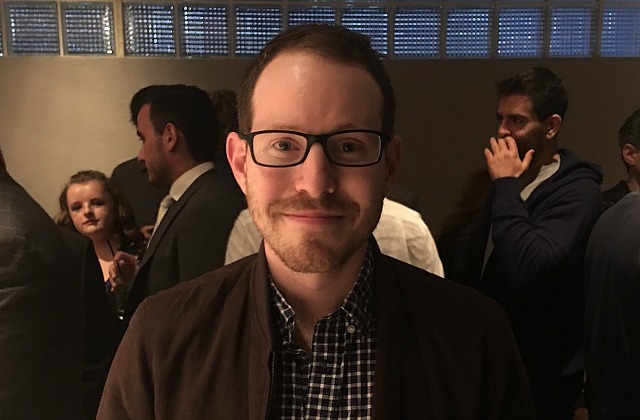
Hereditary director-writer Ari Aster during last night’s post-screening party at Neuehouse.
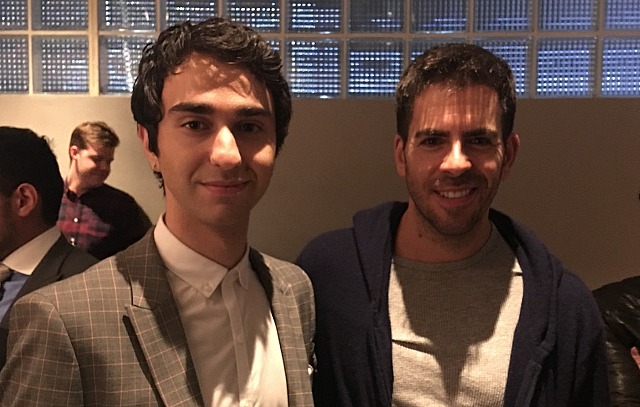
Hereditary costar Alex Wolff, director Eli Roth.
Hereditary begins as a suburban-milieu film about a family of five that’s just become a unit of four. Odd flickerings of weirdness begin to manifest, but nothing you can point your figure at. And then the number drops to three, and then the spooky-weird stuff kicks in a bit more. And then it goes over the fucking cliff.
The film is carried aloft and fused together by Toni Collette‘s grief-struck mom, Annie. It may be Collette’s most out-there performance ever. It’s certainly her most boundary-shattering in terms of connecting with the absolute blackest of currents. Collette convinces you that her character isn’t suffering a psychotic breakdown of sorts, that she’s going through her torments because it’s all 100% real, and at the same time allows you to consider that she has gone around the bend. Or that we may be watching a metaphor for the tortures of grief-driven insanity.
As the narrative advances Annie becomes more and more nutso, but relatably so. That’s quite the acting trick.
Nearly as effective is Alex Wolff as Peter, Collette’s guilt-crippled teenage son, and Ann Dowd as Joan, a kindly and sympathetic woman who meets Collette at a grief-therapy group. Gabriel Byrne is a little morose as Steve, Annie’s husband. The curiously featured Milly Shapiro is fine as Charlie — Peter’s younger sister, Annie and Steve’s daughter.
Catching It Tonight
I’ve heard it all (or most of it), read it all (or most of it), but am watching nonetheless. The DVD pops on 5.29.
From Frank Scheck’s 3.2.18 Hollywood Reporter review: “The documentary, co-directed by Jane McMullen and Leo Telling, brings out the infuriating ‘see no evil, hear no evil, speak no evil’ complicity of those who were aware of Weinstein’s behavior but did nothing to stop it.
“Paul Webster, a former Miramax executive giving his first television interview, says, “Working at Miramax was like being in a cult. The cult of Harvey. I knew I was making a deal with the devil.” He adds, “I think, looking back, that I did know. And I chose to suppress it. I think we were all enablers.”
“[Weinstein is] a terrific documentary, which does an excellent job of summarizing the events in a concise 52 minutes. But there’s one big problem: It’s not long enough. To fully chronicle the massive scope of its subject’s alleged crimes you’d need nothing less than a miniseries. In fact, a limited series. Make that a full season.”
“Solo” Perspective
HE reminder: Solo pops in two days. The second half is okay but don’t expect too much. I never felt turned on or lifted up or caught up in the flow of the thing, and I’m saying this as someone who half-enjoyed The Force Awakens, felt mildly engaged by Rogue One and was half-taken by portions of The Last Jedi. I just couldn’t respond any more. I couldn’t take the plunge.
Alden Ehrenreich does a relatively decent job of pretending to be a youngish, much shorter Han, and if you want to go along with this charade, be my guest. But there’s no eluding the fact he’s nowhere close to being a chip off the old block. There’s a moment when Ehrenreich, listing his strategic attributes to Woody Harrelson, says “I’m a driver”…and I almost said out loud, “Yeah, of a fucking Prius!”
I felt hugely bored and irritated during the first hour, which is all about adrenalizing the ADD crowd with the usual Star Wars distractions — Han-in-big-trouble, Han-escapes-trouble, Han drives like a bat outta hell, the usual derring-do, high-speed chases, pulse-weapon battles, skin-of-their-teeth escapes…wow, wow, wow, wow…nothing.
Solo finally shifts into gear with the arrival of Donald Glover‘s Lando Calrissian and the Millennium Falcon, and especially when the Kessel Run smuggle plan kicks in and yaddah-yaddah. But Han doesn’t get behind the controls of the Falcon until the 90-minute mark. And then the film keeps going for another 40 minutes — it should have ended at the two-hour mark already. Plus I honestly lost patience with Harrelson and Emilia Clarke’s characters pulling last-minute, character-shifting switcheroos. Plus the big poker game in which Han wins the Falcon happens at the very end, almost as an afterthought.
For the 37th time, in order of preference:
1. The Empire Strikes Back (’80). Far and away the most handsomely captured Star Wars film (the dp was Peter Suschitzky) until The Last Jedi (shot by Steve Yedlin) came along. The darkest and finest Star Wars flick because it’s essentially a noir, and because the story points are all about losing, which is totally against the formulaic grain of all fantasy and superhero flicks. Lose, bruise, run for your life. The heroes get chased, kicked around, outflanked, betrayed, ambushed and barely survive. Luke convulsed by self-doubt, losing his right hand in a light-saber battle, horrified by a revelation about his lineage. Han being captured, tortured and put into carbon freeze. Guts but no glory, wounds, pain, “there’ll be another time.”
2. Star Wars (’77) is entirely satisfying for what it is and occasionally quite special, but why is it I haven’t re-watched it in several years? Because it’s nowhere near as good as Empire and I just can’t seem to find the time.
Regrettable Candor
Asked by Time Out‘s Phil de Semlyen if he ever lost any roles due to being openly gay, Ian McKellen recounts the following: “One. Harold Pinter wanted me to be in a film of his [1983’s Betrayal] and he took me to meet the producer, Sam Spiegel. We sat in Spiegel’s office and I happened to say that I was going to New York. He said, ‘Will you be taking the family?’ And I said, ‘I don’t have a family…I’m gay.’ I think it was the first time I came out to anyone. Well, I was out of that office in two minutes. It took Pinter 25 years to apologize for not sticking up for me.”
The part that McKellen would have played, of course, was Ben Kingsley‘s — i.e., Robert, the publisher-cuckold. Kingsley was excellent — it’s my all-time second favorite of his, right after Don Logan — but McKellen would have absolutely killed. If I’d been in McKellen’s shoes that day in Spiegel’s office, I would have said “I don’t have a family” and left it at that. Then he would have delivered a great Pinter performance that would last and last forever. A shame.
McKellen came out in 1988.
Another Obiter Dicta Reveal
There are brilliant X-factor horror flicks — John Krasinski‘s A Quiet Place, Robert Eggers‘ The Witch, Jennifer Kent‘s The Babadook, Andy Muschietti‘s Mama (but not It) and now Ari Aster‘s Hereditary — and there is the pig trough of horror-genre films.
Either you get what serious, classy, smarthouse horror films are up to, or you don’t. Either you understand that when a certain scare switch is flipped by way of hint, suggestion or implication (such as that little-ping moment in Rosemary’s Baby when Mia Farrow reads the journal of a recently-deceased victim of Roman and Minnie Castevet and comes upon the phrase “I can no longer associate myself…”), it connects with convulsive, deep-rooted terrors that are far more disturbing than anything you might find in It.
Not to paint with too wide a brush, but horror-genre fans tend to be on the coarse and geekish side in terms of their preferences. They’re basically about a general opposition to subtlety or understatement of any kind. Which is not to imply that Hereditary errs on the side of understatement. It certainly doesn’t during the second half. But the first half is almost a kind of masterclass in how to deliver on-target chills and jolts through fleeting suggestion rather than the usual sledgehammer approach.
In her 1.30.18 review of Hereditary, The Verge‘s Tasha Robinson wrote while Ari Aster’s film had been praised by Sundance critics as shocking and terrifying, there was nonetheless “some skeptical backlash from horror fans who felt burned by similar advance praise for films like The Witch and It Comes At Night, two extremely tense horror films in which not a whole lot ultimately happens.”
Robinson was dead serious. She really and truly felt that some horror fans (including herself?) felt “burned” by The Witch. Words fail.
From my 2.15.16 review of The Witch: “This is easily the most unsettling and sophisticated nightmare film since The Babadook. That’s a roundabout way of saying that the dolts who pay to see the usual horror bullshit will probably avoid it to some extent. Insensitive, all-but-clueless people tend to favor insensitive, all-but-clueless movies, and I’m sorry but The Witch is mostly too good for them — too subterranean, too otherworldly, too scrupulous in its avoidance of cliches. And because it goes for chills and creeps rather than shock and gore.”
Greatest All-Time Movie Poster?
Poster designer Bill Gold, who passed yesterday at age 97, began in the advertising department of Warner Bros. The year was 1941, when Gold was only 20, and yet his Wikipage says he designed the poster art for Yankee Doodle Dandy and Casablanca, which both opened in ’42. I don’t know who was running WB’s poster design department back then, but some older person was. I’m not throwing shade, but how likely is it that a fresh-faced 21 year-old, straight out of Pratt Institute, was the sole poster designer for two major WB releases, one of which won the Best Picture Oscar?
Gold was the art and concept guy for dozens of classic movie posters, but the Clockwork Orange poster, which he partially designed at age 50 or 51, was arguably his best. (The primary designer was Philip Castle.) Look at it — it doesn’t project lewd or grotesque vibes, but it almost makes the vague notion of ultra-violence and the old in-out, in-out by way of Alex DeLarge and his deplorable droogs seem almost delicious, like candy or ice-cream. Or at the very least slick and stylish, like album-jacket art for a cool band. I would argue that the Clockwork Orange poster is the greatest of all time. It’s perfect. One glance and there’s no forgetting it.
And yet Gold’s trippy one-sheet for John Boorman‘s Deliverance may be the most creatively mis-designed poster for a major studio release that I’ve ever seen. It suggests that what happened between Jon Voight, Burt Reynolds, Ned Beatty and Ronnie Cox on the fictional Cahulawassee River was a matter of individual interpretation or conjecture. Canoe-paddling out of a big eye suggests some kind of surreal or imaginary fantasy, which Deliverance certainly isn’t. The events that occur are absolutely real start to finish, and so the poster lies. Before today I’d never even seen it. So Gold gets one demerit.
